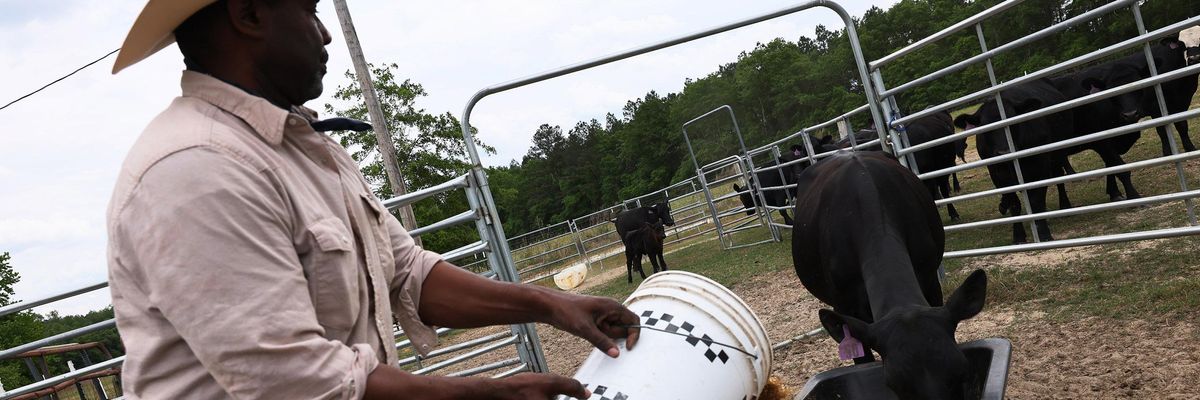You've probably heard that $5 Billion dollars from President Biden's $1.9 Trillion Stimulus plan has been dedicated to farmers of color.
Specifically, that designation is for "socially disadvantaged farmers," which according to the United States Department of Agriculture (USDA), is anyone who has been subjected to racial or ethnic prejudice because of their identity as members of a group.
You should also be aware that the Biden administration is being sued by several white farmers for racial discrimination - not for the government's past actions against people of color, but because the current administration is making an effort to address racism and the historic inequalities inflicted on people of color by the USDA.
Before we get into why Biden's multi-billion-dollar designation to farmers of color is not racist, let's get into some important details of this $1.9 trillion stimulus.
First, according to the Farm Bureau, Biden's plan dedicates approximately $22.7 to nutrition and agriculture. Of that amount, $10 billion is solely for farming, $3.6 billion to purchase and distribute agricultural commodities along with $5 billion intended to provide debt relief for farmers of color.
Consider these numbers in the context of the Trump-era bailouts - the first for $12 billion in 2018, and the second, for $16 billion in 2019 - that funneled cash into the countryside, with the bulk of these payments going to large-scale, white farmers, as well as to agribusiness corporations.
The need for such payments shows how agriculture has changed over the course of the twentieth century.
Some USDA policies, specifically, New Deal-era policies that helped guarantee fair prices (parity) for farmers of certain crops, from milk to corn, have been steadily eliminated over the past decades. Programs that guaranteed fair farm prices and adequate domestic supplies of food were replaced by a system of bigger farms, monoculture grain crops, and livestock confinement facilities designed to produce for a global marketplace.
This policy shift pushed small white and Black farmers off the land, hastening the decline of rural communities. To partially mitigate the disastrous up and down swings of commodity prices in a "get big or get out" global economy, a system of farm subsidy payments, funded by the taxpayer, was established.
Part of this story is how farmers of color in particular, have been systematically denied the same resources that white farmers received.
Pete Daniel, in his book, "Dispossession: Discrimination against African American Farmers in the Age of Civil Rights," documents how Black lost their operations at a disproportionate rate when compared to their white counterparts. Central to the loss of Black farmers was the fact that they were either denied loans outright or were not provided adequate information of public policies to give them a fair chance to qualify for those loans.
In response, Pigford v Glickman, which is the largest civil rights settlement that has been decided to date, sent about $1 billion to individual farmers who were found to have experienced racial discrimination by the USDA. Latino farmers, would follow suit, filing Garcia v Vilsack shortly after the Pigford decision, as would Native Americans, in Keapseagle v Vilsack.
Socially disadvantaged farmers appeared as one group, first receiving resources in the 1994 Farm Bill.
So, taking all this into consideration, we are left with some questions - if white farmers feel disadvantaged, then where are the lawsuits against the other groups, such as veterans or women farmers? Why file a lawsuit that specifically targets farmers of color?
The lawsuit on behalf of a group of white farmers in Wisconsin, launched by the right-wing Wisconsin Institute for Law and Liberty, (like a similar lawsuit in Texas), claims that dedicating resources to specific groups to which white farmers may not belong, is racist.
What such lawsuits really show, is not a concern with agriculture, but instead a shallow form of identity politics that is meant to rally poor, rural white people to the political right. Yet, as USDA Secretary Vilsack noted "--it's pretty clear that white farmers did pretty well," referencing payouts in 2020 relief programs.
Let's be honest - if those on the right really cared about agriculture and rural communities, rather than targeting cash payments to large-scale farmers and agribusiness firms as they chose to do these past few years, policymakers would have dedicated adequate resources to those truly in need and made a real attempt to reform the inflexible and wasteful system that currently feeds us.
The failures of the food system during the pandemic showed us that the corporate-consolidated mode of farming inflexible and wasteful. Creating the conditions that encourage diverse, small-scale farmers to enter the profession is one avenue to a better food system.
Farmers of color - particularly African American producers - have suffered from both the decimation of rural America as well as decades of systemic racism.
We can begin to reverse the racism against Black farmers not only through debt relief but also the $1 billion in outreach and training from the Biden stimulus bill which is necessary to ensure that current and beginning farmers of color acquire the necessary tools to produce food for themselves and their communities.
Most importantly, to address racism it must be confronted directly. Lacking that specific intent, history has shown us that Black people are always left behind.
There is no anti-white racism involved here, only further attempts to perpetuate decades of institutional racism against Black farmers.
